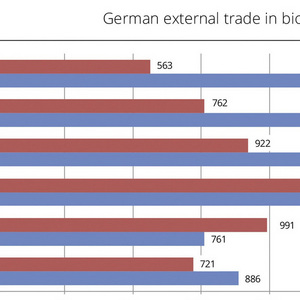2013 a mixed year for German biodiesel

SOURCE: GERMAN FEDERAL STATISTICS OFFICE
May 27, 2014
BY Staff
The Union zur Förderung von Oel- und Proteinpflanzen (UFOP) reports that the sale of biodiesel declined drastically by 90 million gallons in 2013, according to information from the German Federal Office of Economics and Export Control (BAFA). During 2009-’12, biodiesel sales averaged 750.5 million gallons. In 2013, the volume was only 660.5 million gallons.
UFOP says it has determined that the actual decline in vegetable methyl esters is much more dramatic because the BAFA data also includes the offset amount of hydrated vegetable oil (HVO) and biodiesel from waste oils. Assuming HVO sales of 126 million gallons and an estimated sale of up to 60 million gallons of waste-derived biodiesel, the actual sale of conventional biodiesel is only about 480.3 million gallons, UFOP states.
“The consumption statistics spell out the significance of pure fuel marketing in the years 2007-’08 and the total energy quota of 5.25 percent introduced in 2009, as well as its increase to 6.25 for the period 2010-’14,” UFOP says. “However, with the resolution for the Biofuel Quota Act having been passed as a clear indication of political will, the UFOP has criticized that volume balancing for compensation of the incremental reduction in the tax concession—biodiesel has been subject to full taxation since 2013—will creep in due to the double apportionment of biofuels from waste oils and as a result of HVO imports.”
Advertisement
While German biodiesel sales were down last year, the nation did set a biodiesel record in 2013. At around 480.3 million gallons (just under 1.6 million metric tons), the German biodiesel industry set a new export record last year, according to an appraisal by the Agricultural Market Information Co. based on BAFA data. The appraisal shows exports from Germany have risen by 20 percent, or roughly 105 million gallons, in comparison to the previous year. UFOP notes that, in the same period, biodiesel imports fell from 228.1 million gallons to 168.1 million gallons.
The UFOP states several reasons for this. The tariffs put on Argentine and Indonesian biodiesel are now showing their effect. Less than 2.25 million gallons of biodiesel was imported from Indonesia. UFOP also says the export balance “confirmed the competitiveness of the German biodiesel industry and consequently its international marketing expertise.” UFOP states that the U.S., with 54 million gallons, is its most important partner outside the EU.
Advertisement
Related Stories
Montana Renewables LLC has delivered its first shipment of 7,000 gallons of SAF to Dearborn, Michigan's Buckeye Pipeline facility. From there, the fuel will be transported to the Detroit Metropolitan Airport via pipeline for use by Delta Air Lines.
NYC took a monumental step towards clean air and a sustainable future on Jan. 11 with the grand opening of the city's first retail fuel station dispensing renewable diesel. The project is a collaboration between Sprague and Sonomax.
The USDA on Jan. 11 awarded $19 million under the Higher Blend Infrastructure Incentive Program. The grants will support projects in 22 states to expand the availability of higher ethanol and biodiesel blends.
Jet Aviation partners with World Fuel Services to offer SAF in Bozeman, Montana, and Scottsdale, Arizona
Jet Aviation announced on Dec. 22 that it has signed an agreement with World Fuel Services to secure and offer sustainable aviation fuel (SAF) on-site at its FBOs in Bozeman, Montana, and Scottsdale, Arizona, effective immediately.
Neste has partnered with Coleman Oil Company, a leading provider of fuels, biofuels, lubricants, and related products, to enable cities and businesses to have easier access to Neste MY Renewable Diesel in the state of Washington in the U.S.
Upcoming Events










